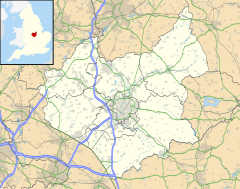Bringhurst
| Bringhurst | |
|---|---|
| Bringhurst shown within Leicestershire | |
| OS grid reference | SP842921 |
| District | |
| Shire county | |
| Region | |
| Country | England |
| Sovereign state | United Kingdom |
| Post town | MARKET HARBOROUGH |
| Postcode district | LE16 |
| Police | Leicestershire |
| Fire | Leicestershire |
| Ambulance | East Midlands |
| EU Parliament | East Midlands |
Bringhurst is a small village and civil parish in the Harborough district of south-east Leicestershire, bordering Northamptonshire and Rutland. Nearby places are Cottingham in Northants, Great Easton and Drayton in Leicestershire, and Caledecott in Rutland. The population is included in the civil parish of Great Easton.
The village antedates the Norman Conquest (1066 AD) and the manor was given by Ranulfe, a kinsman of King Edward the Confessor to the Abbey of Peterborough. Bringhurst is, according to W. G. Hoskins, one of the oldest village sites of the Anglo-Saxon period in the county. Bringhurst is one of the ancient Leicestershire villages not recorded in the Domesday Book (1086); however information about it is included in the entry for Great Easton indicating that Great Easton had acquired more importance than the older village on the hill-top. By the 13th century most villages in the county were growing in population but Bringhurst, being badly sited, probably was not.
The village church of St Nicholas is 13th century in date. The older houses are made of local stone and either roofed with thatch or Collyweston slate.
The name of the village predates its use as a family name, the earliest mention of which is dated 1260. Earlier variations of the name, such as "Bruninghurst" were first recorded in 1188. Other variations include "Bringherst", "Brinkhurst", "Bringhast", and "Bringhaste". The etymology of Bringhurst comes from the personal name "Bryni" derived from "bryne" (Old English), meaning "fire" or "flame", combined with the word "hurst" or "hyrst" meaning "wooded hill" in Old English, related to Old Saxon, and "hurst" or "horst" in Old High German.
...
Wikipedia

